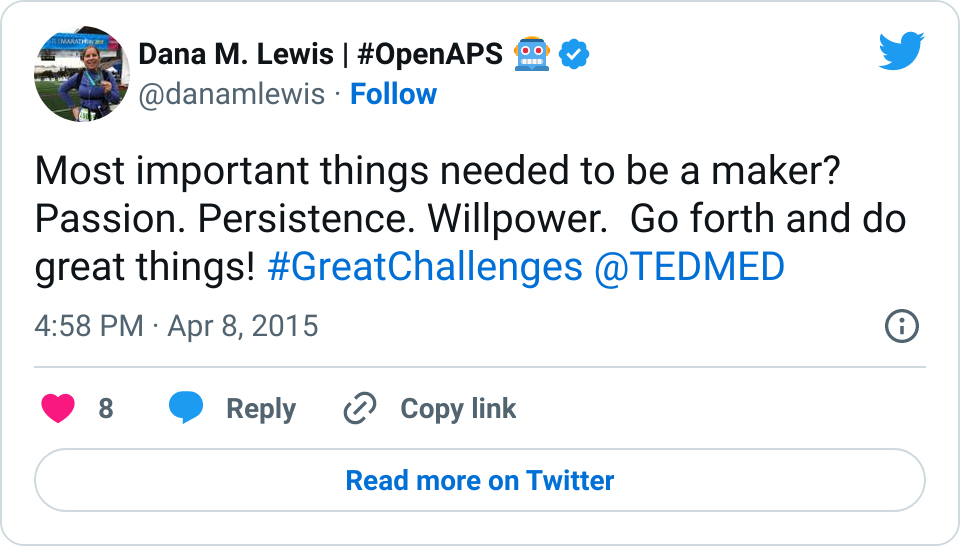I had a conversation this week with someone in the CGM in the Cloud Facebook group, after they indicated they wouldn’t be (or maybe weren’t interested in) joining the “dev” group for #OpenAPS – and it’s a conversation I find myself having often. Here’s what I usually end up saying, when someone says they’re not a “dev” or “not an engineer” or something similar:
“I’m not a formally trained developer/coder/engineer, either… but I keep telling people, many people in this project aren’t- it’s a passion project where we learn what we need to learn to do the things we want to do. It’s fine if someone chooses not to do something, but I encourage everyone to not let labels or perceptions of traditional roles stop them from jumping in and giving it a try to see what they can learn and thus do! Especially with this awesome supportive community of people willing to help you as you go.”
This also came up when we were discussing what it takes to be a “maker” on TEDMED’s #GreatChallenges live panel today. One of my excellent fellow panelists (Cole) pointed out that pretty much everyone is a maker – whether you tweak a recipe, work with wood, or find any kind of workaround of any sort to make things work. (Which in my mind makes every single person with diabetes a “maker” and probably anyone with any disease or health care condition that they live with.)
I previously wrote about what it takes to DIY from a DIYPS and #OpenAPS perspective (and why that’s important), but I think it holds true across any aspect of diabetes or any other disease state – and definitely beyond healthcare:

So please, don’t let labels stop you from DOING. You can learn whatever tech skills you set your mind to. You can find numerous ways to solve a problem, whether it’s on your own or by partnering with someone else – and there’s plenty of people with the skills who are willing to help you learn, too.Remember, we started building #DIYPS to make louder CGM alarms. Scott and I have both learned numerous new things and new programming languages and skills along the way as we went from alarms to an alert and recommendation system to a closed loop artificial pancreas (and now people who own 4 Raspberry Pis). We didn’t come to the table with knowledge of everything we needed to know to do what we first wanted to do – and we’re definitely still learning a dozen or more things (programming languages, new software, etc.) along the way as we continue with #OpenAPS. We also didn’t know anything previously about working directly with the FDA – and now we are, on a number of projects, in order to help scale from n=1 of a DIY artificial pancreas to many n=1s around the world.
You can do this. Bring your passion, and go do great things!
#WeAreNotWaiting, are you?
The tslim does have a record of temp basals in the history menu, but it isn’t easy to get to. After unlocking, it takes five button pushes. But it is there!